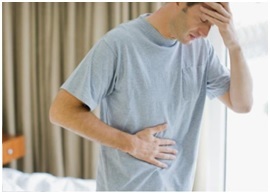Dizziness after eating: causes, symptoms, treatment
Contents:
- Dumping syndrome
- Food allergy
- Unbalanced diet
- Anemia
- Blood sugar level
- Diseases of the gastrointestinal tract
 Dizziness is a special condition in which a person can sense a loss of balance or a violation of vision clarity. Why does dizziness occur after eating and what are the reasons for this? Most often, dizziness after eating is due to the development or progression of such diseases:
Dizziness is a special condition in which a person can sense a loss of balance or a violation of vision clarity. Why does dizziness occur after eating and what are the reasons for this? Most often, dizziness after eating is due to the development or progression of such diseases:
- dumping syndrome;
- food allergy;
- unbalanced power;
- anemia;
- hypoglycaemia;
- hyperglycemia;
- of the GI tract.
Dumping syndrome
In his attacks, a person can have high blood pressure, headaches and dizziness. This condition is not a separate disease, but it can cause quite unpleasant sensations.
The cause of the dumping syndrome is the flow of blood to the stomach and pancreas( after eating), which causes the brain to experience oxygen starvation.
After eating, food moves from the stomach to the intestines, which leads to pressure and release of catecholamine( a specific substance that provokes a symptom).Thus, a person suffers from a sudden attack of malaise. In order to stop the dumping syndrome, it is necessary to adhere to such dietary rules:
- to comply with the regime for food intake to prevent the development of hunger;
- eat several times a day a full portion and do not follow a diet, because after them there will still be a risk of overeating, which can only exacerbate the course of attacks of dizziness;
- to minimize the consumption of sweet and flour since it is difficult to digest;
- regularly check blood sugar levels.
Food allergy
The reaction of the body to food is called food allergy. It can occur after taking various dishes or individual foods. Most often it is caused by citrus fruits, nuts, honey, chocolate and strawberries.
In this condition, a person may have a stomach ache, a rash on the body may appear and the head is spinning. To relieve yourself of such unpleasant symptoms, it is enough just to stop using an allergen.
Unbalanced diet
Too rough unbalanced diet can cause dizziness during eating. The principle of its development is a bit like a dumping syndrome, however, in such a state a person can also experience nausea and spasms.
This is explained by the fact that in the acute shortage of nutrients, which are often on the menu of diets, the human body is so exhausted that when it gets a lot of nutrients, it simply can not properly digest them.
For this reason, only an experienced gastroenterologist or nutritionist should write the diet menu. Making yourself a restrictive menu can be dangerous for your health.
Anemia
Vertigo in anemia is one of the most dangerous, since in such a state a person can easily lose consciousness. Anemia is a pathological condition in which the human hemoglobin level in the blood drops dramatically. This, in turn, leads to a lack of oxygen. In anemia, in addition to dizziness, the following symptoms may also develop:
- weakness;
- tinnitus;
- fainting;
- shortness of breath;
- loss of strength;
- increased heart rate.
Blood sugar level
Hypoglycemia( lowering of blood sugar level) can also cause a symptom after eating. To provoke the condition can such factors:
- the introduction of a greater amount of insulin;
- receiving a large dose of sugar-reducing tablets;
- excessive alcohol consumption may cause dizziness in diabetes.
Hyperglycemia( elevated blood sugar levels) often causes dizziness in diabetes mellitus. In contrast to hypoglycemia, hyperglycemia is less pronounced and pronounced. A person in this state can not even feel any changes.
The main symptoms of hyperglycemia are:
- dry mouth;
- frequent urge to urinate;
- dizziness;
- darkening in eyes;
- headache;
- increase in blood pressure.
Important! In order to prevent the development of hyperglycemia, people suffering from diabetes should regularly check blood for sugar levels.
Diseases of the gastrointestinal tract
 Dizziness in diseases of the digestive tract is considered one of the most common. For example, dizziness with gastritis may occur after half an hour after eating, and dizziness in pancreatitis can be chronic and if this disease is not treated, then its seizures will be repeated again and again. Often in the pathology of the gastrointestinal tract, dizziness is associated with pain in the abdomen and head.
Dizziness in diseases of the digestive tract is considered one of the most common. For example, dizziness with gastritis may occur after half an hour after eating, and dizziness in pancreatitis can be chronic and if this disease is not treated, then its seizures will be repeated again and again. Often in the pathology of the gastrointestinal tract, dizziness is associated with pain in the abdomen and head.
Immediately after the appearance of the first signs of dizziness, you should consult a doctor to determine the root cause of the symptom.
write the question in the form below:



